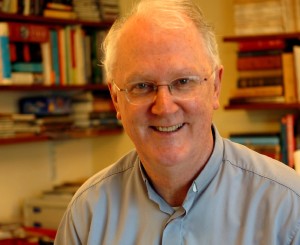
By Sarah Mac Donald - 22 May, 2016

Fr. Brendan Hoban, PP., Ballina. Picture: Henry Wills, Western People.
The Association of Catholic Priests has urged the bishops to support their call for a national synod for the Irish Church.
The group, which represents over 30% of Irish priests, would like to see something similar to the process which took place last month in the diocese of Limerick.
At the first meeting between representatives of the priests’ group and representatives of the Irish hierarchy in two years a frank discussion took place on the crisis in the Irish Church.
The bishops’ delegation was led by Archbishop Kieran O’Reilly of Cashel & Emly and he was accompanied by Bishop Ray Browne, Bishop Philip Boyce and Bishop Denis Nulty.
Dublin priest Fr Dermot Lane made a presentation on the future of the Catholic Church in Ireland. He listed the problems currently faced by the Irish Church including the decline in practice and the decline in vocations.
He suggested that people were asking “what’s the plan to deal with the crisis?”
“The Church is at a cross-roads,” he said, “and we could get stuck at the cross-roads unless we decide to respond proactively”.
Fr Lane suggested that as a Church it needed to initiate a process in the spirit of the Second Vatican Council and in the spirit of Pope Francis who was a beacon of hope and possibility.
He put forward the following three strategies and urged the bishops to implement them:
(i) to realistically ascertain what the present situation is by gathering precise data on the present situation, the resources available to us and what needed to be prioritised;
(ii) to train lay men and women for ministry;
(iii) to underline the importance of bishops, priests and people working together.
The ACP proposal for a National Synod envisages something that would move from discussion and consultation at parish level to diocesan level to national level.
The ACP representatives said they were ready and willing to further this proposal through ongoing engagement with the Bishops’ Councils for the Clergy, for Faith Renewal and Faith Development, and for Liturgy.
“This proposal would put flesh on Pope Francis’s encouragement of a synodal Church, pursuing a synodal process. In other words the Church would become a listening Church, an inclusive Church, that through active participation and involvement could generate new energy, enthusiasm and hope,” the priests’ representatives said.
The important point, Dermot Lane concluded, is that the process of engagement is central as it presents a model of Church where everyone works together.
The ACP delegates asked that this proposal for a synod be presented to the Irish bishops.
On the well-being of priests, Fr Brendan Hoban told the meeting that the ACP was becoming more and more aware of a growing problem around the well-being of priests.
Many priests were struggling as a result of huge mental and physical pressure from a variety of sources: age resulting in a decline of energy and enthusiasm; isolation; ever-increasing work-load; ever-increasing demands of ministry; low morale; despair as vocations decline so massively; little free time; ill-health; and a lack of confidence in dealing with difficult emerging social issues in parish work, he said.
“At present many diocesan priests, unlike in the past, lived unhappily alone without the support-systems they needed in their declining years.”
He warned that younger priests were distressed by the reality they faced: increasing work-loads; few vocations; wondering whether or why they would stay with priesthood; the difficulty of saying Mass when so few of their peers attend; and the difficulty some experienced of even attending meetings with older priests with whom they had little in common.
A discussion followed on how difficult a challenge the ‘care of priests’ is, how difficult bishops find it, and what might be done.
The discussion turned towards the stress engendered by a fear of false allegations of sexual abuse.
According to the ACP, many cases were badly handled, and that many priests had lost faith in the goodwill of their bishops, that supports demanded by canon law were not always made available to priests, that some priests were very badly treated and had suffered much.
It was pointed out that many priests believe that their bishops would not be supportive of them if an allegation was brought against them.
The ACP made the point that effective protocols were one thing but how they were implemented was another and that sometimes, even in neighbouring dioceses, there was a huge variety of practice.
The bishops pointed out that many of the problems were associated with the early years when bishops had very little advice available to them but that new protocols were expected which should improve the overall situation.
On the issue of the ‘silenced’ priests in the Irish Church, Fr Seán McDonagh suggested that this issue needed to be dealt with.
He noted that Pope Francis had recently said that every problem didn’t need the magisterium of the Church to deal with it.
“The present process, where an ethos of secrecy dictated that an accused individual wasn’t dealt with directly, didn’t know who his accusers were and didn’t even know when a process was initiated,” made him feel “ashamed” of his Church, the Columban priest said.
On behalf of the ACP he asked the bishops to take up a position on the priests who had been silenced and to develop a more just and respectful process for dealing with such cases as they arose.
The men involved had given life-times of service to the Church, were deeply respected and their continued treatment was regarded as a source of great scandal by many Catholics in Ireland.